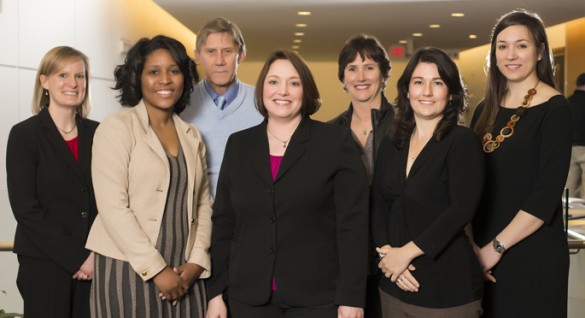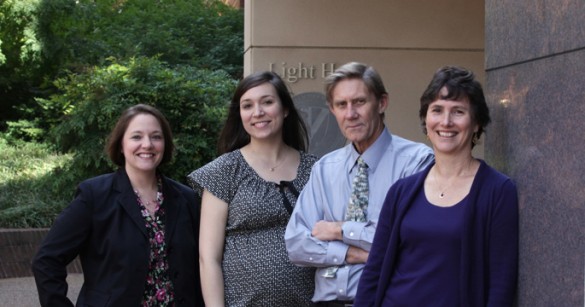
by Courtney Bricker-Anthony
In 2013, Vanderbilt University School of Medicine (VUSM) received one of 10 grants from the National Institutes of Health called BEST (Broadening Experiences in Scientific Training) to help train scientists for a variety of diverse careers.
The program grew from a workforce study indicating that 80 percent of people with biomedical Ph.D.s are employed in careers outside of conventional faculty positions.
Three years later officials and students at the school say that it has already achieved its early goals and continues to expand.
Vanderbilt’s program under the BEST grant is called ASPIRE (Augmenting Scholar Preparation and Integration with Research-Related Endeavors).
“The formation of the BEST consortium marked a national sea change in the attitude toward career training for biomedical scientists,” said Kathleen Gould, Ph.D., associate dean for Biomedical Sciences and director of Graduate Student Support who, along with Roger Chalkley, D. Phil., senior associate dean in the Biomedical Research Education and Training (BRET) office, and Kimberly Petrie, Ph.D., director of Career Development, serves as the principal investigators on the grant.
“This is the first time, at the national level, that there has been such a concerted effort to broaden the biomedical training experience to include providing insight to careers outside of running research labs and holding faculty positions,” said Ashley Brady, Ph.D., assistant professor of Medical Education and Administration and manager of the ASPIRE program.
ASPIRE seeks to accomplish the goals set forth by the NIH by offering trainees career-oriented seminars, workshops, training modules and internships/externships. The training modules, which cover business/entrepreneurship, communication, clinical research and teaching, attracted nearly 300 individual trainees over the past two years.
“I learned how to communicate science effectively to a general audience,” said Dikshya Bastakoty, Ph.D., who took the “Biomedical Research and the Media” module, which focuses on journalism, social media and effective communication. “My new job involves significant writing and my skills and experience from this module were key in helping me get the job.”
Kim Riley, Ph.D., who went on to a clinical research coordinator position at Duke University after taking the NIH Clinical Center’s annual course, “Introduction to the Principals and Practice of Clinical Research (IPPCR),” agreed that an ASPIRE module helped advance her career.
“Due to taking the course, I realized that clinical trial management was a viable career option for me,” she said. “After I graduated from Vanderbilt, I was offered a position at Duke, which I know was heavily due to the fact that I took the IPPCR course.”
The ASPIRE program also is fostering relationships with local businesses and universities to provide trainees with hands-on training in their desired fields. Internships have been offered in career areas including science policy, college teaching, health care data analytics and even craft beer brewing.
Rubin Baskir, a graduate student, recently completed a policy internship with Life Science Tennessee, the state’s life-sciences industry organization, and said, “The work I have done so far with the BRET office’s help has shown me how valuable a science background is in crafting policy and has allowed me to make connections in this arena.”
Lindsey Morris, Ph.D., who was hired for a senior data scientist position at axialHealthcare after her Vanderbilt training said “I took full advantage of what the ASPIRE program and BRET office had to offer. I don’t think I could be in this position without their support. I’m in a job that I always envisioned myself doing.”
Since its inception with 10 schools, the BEST program has grown to a consortium of 17 institutions, for which Vanderbilt’s D’Anne Duncan, Ph.D., the program manager, is national coordinator.
“One key to our early successes is the enthusiasm and participation of faculty and staff from across our institution,” Gould said. “Local business leaders have also given generously of their time and expertise. I fully expect that ASPIRE’s success will attract new partnerships between our institution and local industry as well as serving as an example of how to develop effective Ph.D. career training opportunities.”
ASPIRE by the numbers
Institutions in the NIH consortium that is managed by Vanderbilt: 17.
Beyond the Lab Vanderbilt alumni interviews showcasing a variety of career paths: 34
Times those videos have been viewed: 6,000
Trainees who have taken an ASPIRE module: 300
Articles published in the VUMC Reporter by students of the Biomedical Research and Media module: 20
Trainees who learned about statistical methods, study design and ethical and regulatory matters pertaining to clinical studies in the Introduction to the Principals and Practice of Clinical Research (IPPCR) course: 110
Trainees who completed and passed the optional NIH exam for the IPPCR course: 54
Trainees who participated in externships or job shadowing experiences: 27
Internships positions offered to trainees: 18
Trainees participating in ASPIRE internships: 14
A more detailed version of this story on the ASPIRE website is here.















